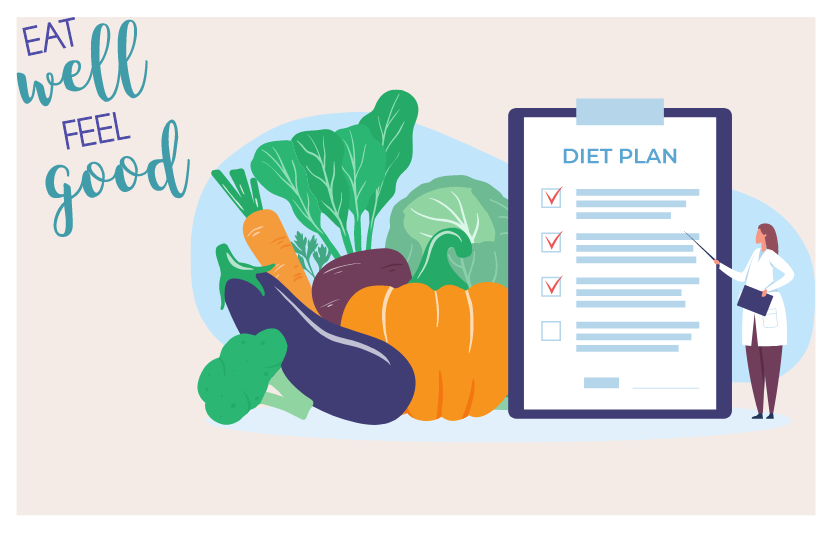» Physical and mental well-being
Self-Growth: How Nutrition Can Enhance Your Mental health
Introduction
Self-growth is a lifelong journey of personal development. It is about constantly striving to become the best version of ourselves and unlocking our true potential. While there are many factors that contribute to self-growth, one often overlooked aspect is nutrition.
The food we eat plays a crucial role in our overall well-being, including our mental health, energy levels, and cognitive function. In this article, we will explore the connection between proper nutrition and self growth, and discover how making conscious choices about what we eat can have a great impact on our journey of personal development and well-being.

The Importance of Self-Growth and its Connection to Nutrition
Self growth is not just a buzzword; it is a fundamental aspect of our lives. It is about constantly learning, evolving, and becoming better versions of ourselves. When we begin a journey of self growth, we are committing to personal development and self-improvement. This can involve various practices such as setting goals, cultivating positive habits, and seeking new experiences and self-care.
One aspect of self growth that is often overlooked is nutrition. The food we eat provides the fuel for our bodies and minds. When we nourish ourselves with a balanced and nutritious diet, we are providing our bodies with the necessary resources to function optimally. Proper nutrition is like the foundation of a house; without it, our self-growth journey may struggle to take off.
Understanding the Impact of Nutrition on Mental Health
Our mental health is closely intertwined with our overall well-being. It affects how we think, feel, and behave. Mental health issues such as anxiety and depression can hinder our self-growth journey and prevent us from reaching our full potential.
Research has shown that there is a strong link between nutrition and mental health. Certain nutrients, such as omega-3 fatty acids, B vitamins, and magnesium, have been found to support brain health and improve mood. Conversely, a diet high in processed foods, sugar, and unhealthy fats has been associated with an increased risk of mental health disorders.
By being mindful of our nutritional choices, we can nourish our bodies and minds, and support our mental health. Incorporating nutrient-dense foods such as fruits, vegetables, whole grains, and lean proteins into our diet can have a positive impact on our mood and overall well-being, and ultimately enhance our self-growth journey.
The Role of Proper Nutrition in Boosting Energy Levels and Focus
Energy and focus are essential for self-growth. Without sufficient energy, we may lack the motivation and drive to pursue our goals and aspirations. Similarly, without focus, we may struggle to stay on track and make progress in our self-improvement journey.
Proper nutrition plays a crucial role in boosting energy levels and enhancing focus. When we provide our bodies with the right nutrients, we are fueling ourselves for success.
Nutrients such as complex carbohydrates, iron, and vitamin B12 are particularly important for energy production. Incorporating foods such as whole grains, legumes, dark leafy greens, and lean meats into our diet can help ensure we have the energy and focus we need to thrive in our self-growth journey.
Nutrients that Support Brain Health and Cognitive Function
Our brain is at the center of our self-growth journey. It is responsible for our thoughts, emotions, and decision-making processes. Therefore, it is vital to support our brain health and cognitive function through proper nutrition.
Several nutrients have been found to have a positive impact on brain health and cognitive function. Omega-3 fatty acids, commonly found in fatty fish, walnuts, and flaxseeds, have been shown to improve memory and cognitive performance.
B vitamins, found in whole grains, legumes, and leafy greens, play a crucial role in brain development and function. Antioxidants, such as vitamins C and E, found in fruits and vegetables, help protect the brain from oxidative stress.

By incorporating these brain-boosting nutrients into our diet, we can enhance our cognitive abilities, improve our memory, and sharpen our focus, ultimately supporting our self-growth journey.
The Link Between a Healthy Diet and Emotional Well-being
Our emotional well-being is closely connected to our nutrition. The food we eat can have a profound impact on our mood, emotions, and overall mental well-being.
Research has shown that a diet rich in fruits, vegetables, whole grains, and lean proteins is associated with a lower risk of depression and anxiety. On the other hand, a diet high in processed foods, sugar, and unhealthy fats has been linked to an increased risk of mental health disorders.
When we nourish ourselves with a healthy, balanced diet, we provide our bodies with the necessary nutrients to support emotional well-being. By incorporating more plant-based foods, reducing our intake of processed foods, and staying hydrated, we can positively impact our mood, reduce stress levels, and support our self-growth journey.
Tips for Creating a Nutrition Plan that Supports Your Self-Growth Journey
Creating a nutrition plan that supports your self-growth journey can be empowering and transformative. Here are some tips to help you get started:
- Set clear goals: Determine what you want to achieve on your self-growth journey and align your nutrition plan accordingly. Whether it’s increasing energy levels, improving focus, or supporting emotional well-being, having clear goals will guide your food choices.
- Focus on whole, nutrient-dense foods: Prioritize fruits, vegetables, whole grains, lean proteins, and healthy fats. These foods are packed with essential nutrients and provide the foundation for optimal health and self-growth.
- Stay hydrated: Dehydration can negatively impact energy levels, focus, and overall well-being. Make sure to drink plenty of water throughout the day to support your body and mind.
- Meal prep: Planning and preparing your meals in advance can help you make healthier choices and stay on track with your nutrition goals. Set aside time each week to plan your meals, create a grocery list, and prepare nutritious meals and snacks.
- Practice moderation: While it’s important to prioritize nutrient-dense foods, it’s also essential to allow yourself flexibility and enjoyment. Incorporate your favorite treats in moderation, and savor them mindfully.
Recipes and Meal Ideas for Nourishing Your Mind and Body
To support your self-growth journey, here are some recipes and meal ideas that will nourish your mind and body:
- Breakfast: Start your day with a nutrient-packed smoothie. Blend together spinach, banana, almond milk, chia seeds, and a scoop of protein powder for a quick and energizing breakfast.
- Lunch: Enjoy a colorful and satisfying salad. Combine mixed greens, grilled chicken or tofu, cherry tomatoes, cucumber, avocado, and a drizzle of olive oil and lemon juice for a refreshing and nourishing meal.
- Snack: Keep your energy levels up with a handful of mixed nuts and a piece of fruit. The combination of healthy fats and natural sugars will provide a sustained source of energy.
- Dinner: Prepare a delicious and nutritious stir-fry. Sauté your favorite vegetables, such as broccoli, bell peppers, and snap peas, with lean protein like shrimp or tofu. Serve over brown rice or quinoa for a complete and wholesome meal.
Remember, these are just a few examples, and the possibilities for nourishing meals are endless. Get creative in the kitchen and experiment with different flavors, textures, and ingredients to find what works best for you and your self-growth journey.

Seeking Professional Guidance: Working with a Nutritionist or Dietitian
If you feel overwhelmed or unsure about how to create a nutrition plan that supports your self-growth journey, seeking professional guidance can be beneficial. Nutritionists and dietitians are experts in the field of nutrition and can provide personalized advice and support.
A nutritionist or dietitian can help you identify your specific nutrition needs, develop a meal plan that aligns with your self-growth goals, and provide ongoing guidance and accountability. They can also help address any specific dietary concerns or restrictions you may have.
By working with a professional, you can gain a deeper understanding of the relationship between nutrition and self-growth and receive the support you need to optimize your journey of personal development.
Conclusion: Empowering Yourself through Proper Nutrition and Self-Growth
Proper nutrition is a powerful tool that can supercharge your self-growth journey. By nourishing your body and mind with a balanced and nutritious diet, you can enhance your mental health, boost your energy levels and focus, and support your emotional well-being.
Setting clear goals, and seeking professional guidance can further enhance your nutrition plan and empower you on your self-growth journey. Remember, self-growth and self-care are lifelong process, and every choice you make, including the food you eat, has the potential to shape your path of personal development.


